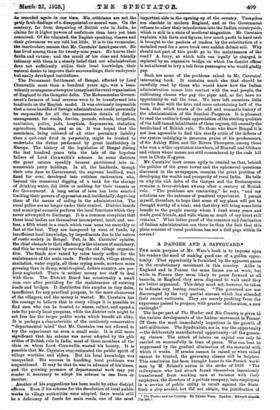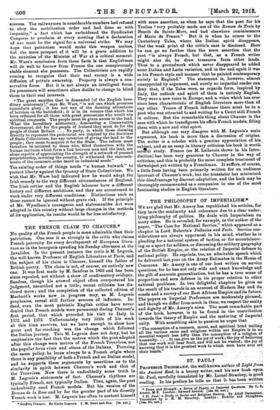A DANGER AND A SAFEGUARD.*
THE main purpose of. Mr. Ware's book is, to impress upon his readers the need of making good use of a golden oppor, tunity. That opportunity is furnished by the apparent pause in the revolutionary movement in this country. Alike in England and in France the same forces, are at work, but while in France they seem. likely to press forward at all hazards, in England they seem disposed to wait until they are better organized. This delay must not, however, bo taken to indicate any lasting reaction. "The governed are not discouraged by the rely partial success which has attended their recent outbursts. They are merely profiting from the experience gained to prepare, with greater deliberation, a new
. , onslaught."
The larger part of The Worker and His Country is given to the various developments of the Labour movement in Fretted. Of these the most immediately important is the growth et anti-militarism. The Syndicalists see in war the.opportunitY —the deliberately manufactured opportunity—of the govern- ng classes. The attack of labour on capital can only be carried on successfully in time of peace. War can best be seppressed by the gradual elimination of the material with which it works. If armies cannot be raised, or when.raised cannot be trusted, the governing classes will be helpless. This conclusion has been brought home to the French work: man by Alf: Briand's action in the strike of 1910. " The railwaymen . who had struck found themselves. ingeniously transformed' from working men at variance with their employers, the directors of a private company, into employees in a service. of public utility in revolt against the State. Such a step needed, but did not obtain, the justification of • The Worker and his Country. By Behan Ware. London : Edward Arnold. [Ea. net .1 'success. The railwaymen in considerable numbers had refused eto obey the mobilization order and had done so with i mpunity," a fact which has emboldened the Syndicalist Congress to proclaim at every meeting that a declaration of war must be the signal for a universal alike. We may
-hope that patriotism would make this weapon useless, but the mere prospect of it will be a grave addition to
the anxieties of the Minister of War at a critical moment. Mr. Ware's conclusion from these facts Is that Englishmen will do well to borrow from France the one conspicuously stable element she possesses. The Collectivists are rapidly coming to recognize that their real enemy is a wide diffusion of private ownership. Property is always a con- servative force. But it is not always an intelligent force. Its possessors will sometimes allow dislike to change to blind them to their real interests.
"The great sacrifice that is demanded [of the English here- ditary aristocracy]," says Mr. Ware, " is not one which promises immediate glory ; it has not any of the dazzling attractions of heroism on the battlefield ; it is in its essence that which has been ordained for all those with great possessions who would win spiritual conquests. The people must be given access to the land. What the hereditary aristocracy, dominating a Conservative Government, did for the people of Ireland they must do for the people of Great Britain. . . . No party, in which those claiming directly to represent the proletariat are inspired by the doctrines of State Collectivism, has any intention of giving the land to the people ; they mean to acquire it for the State. The reform must therefore be initiated by those who, filled themselves with the human instincts which form a link between men and the land, are alone capable of appreciating the strength of a network of peasant proprietorship, covering the country, to withstand the encroach- ments of the economic order based on industrial needs."
The existing order of things needs "a human bulwark" to protect liberty against the tyranny of State Collectivism. We wish that Mr. Ware bad indicated how be would adapt the Irish remedy to the very different circumstances of England. The Irish cottier and the English labourer have a different history and different ambitions, and they are accustomed to work under very different conditions. Distinctions such as these cannot be ignored without grace risk. If the principle of Mr. Wyndham's courageous and statesmanlike Act were adopted in this country without large changes in the methods of its application, its results would be far less satisfactory.















































 Previous page
Previous page